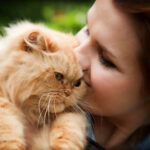The rise of designer pets has taken a concerning turn with the emergence of “Bully Cats,” a feline equivalent to the controversial XL bully dogs. Bred in the US and now reportedly spreading to the UK, these hybrid cats are raising alarm bells among animal welfare experts due to serious health concerns and ethical breeding practices.
Bully cats are a hybrid breed created by crossing sphynx cats, known for their hairlessness, with munchkin cats, recognized for their unusually short legs. This combination, intended to produce a cat resembling XL bully dogs in appearance, is feared to come at a significant cost to the animals’ health and well-being.
Experts, in a recent research paper highlighted by the Telegraph, warn that bully cats are likely to have a considerably shorter lifespan – potentially at least six years less than average cats – due to the multitude of health issues associated with their genetic makeup.
Dr. Grace Carroll, an animal behavior and welfare specialist at Queen’s University Belfast, emphasizes the ethical implications in an article in The Conversation. She urges potential pet owners to consider the risks of “mutant and experimental breeds” and highlights the power consumers hold in discouraging unethical breeding practices.
Ethical concerns over bully cat breeding practices prioritizing aesthetics over animal welfare.
Dr. Carroll argues, “We can discourage breeders from prioritising aesthetics over the health and welfare of the animals by refusing to buy breeds with extreme traits.” She advocates for “ethical breeding” that prioritizes healthier, happier cats able to express natural feline behaviors. “We should let cats be cats,” she states.
Despite the serious welfare concerns, bully cats are being promoted on social media, and breeders are reportedly already offering them for sale in the UK. This is happening even though significant health defects are inherent to the breed.
One major issue stems from the sphynx cat lineage, as bully cats inherit the lack of whiskers. Whiskers are crucial for feline communication and spatial navigation, meaning bully cats may face challenges in these areas.
Furthermore, the hairlessness inherited from sphynx cats presents additional health risks. “Kittens already have a limited ability to regulate their body temperature and this is made even more difficult by hairlessness,” explains Carroll. This makes bully kittens particularly vulnerable to respiratory infections. Hairless cats are also susceptible to sunburn and skin cancer due to the lack of fur protection.
Bully kittens are more vulnerable to health issues due to hairlessness and underdeveloped body temperature regulation.
The munchkin cat gene, responsible for the bully cat’s short legs, also contributes to significant health problems. According to a spokesperson from Cats Protection, “Their short legs are a genetic defect which can lead to painful arthritis and cause problems with their general mobility.” This genetic defect severely impacts their quality of life, causing chronic pain and limiting their natural movement.
The NatureWatch Foundation, an organization campaigning for animal welfare and investigating illegal animal trade, has expressed shock at the emergence of bully cats in the UK. They stated, “It’s shocking to see that these poor cats are starting to appear in the UK.” They draw a parallel to extreme breeding practices in dogs, warning that “unscrupulous people are now turning their attention to exploiting cats in the same way, all in the pursuit of greed and social media likes.”
In conclusion, the creation of bully cats represents a worrying trend in pet breeding, prioritizing extreme aesthetics over the fundamental health and welfare of these animals. Experts strongly advise against purchasing bully cats due to their inherent health problems and the ethical concerns surrounding their breeding. Choosing to not support this breed is a crucial step in promoting responsible and ethical practices within the pet industry, ensuring that “cats can be cats” – healthy, happy, and free from preventable suffering.

